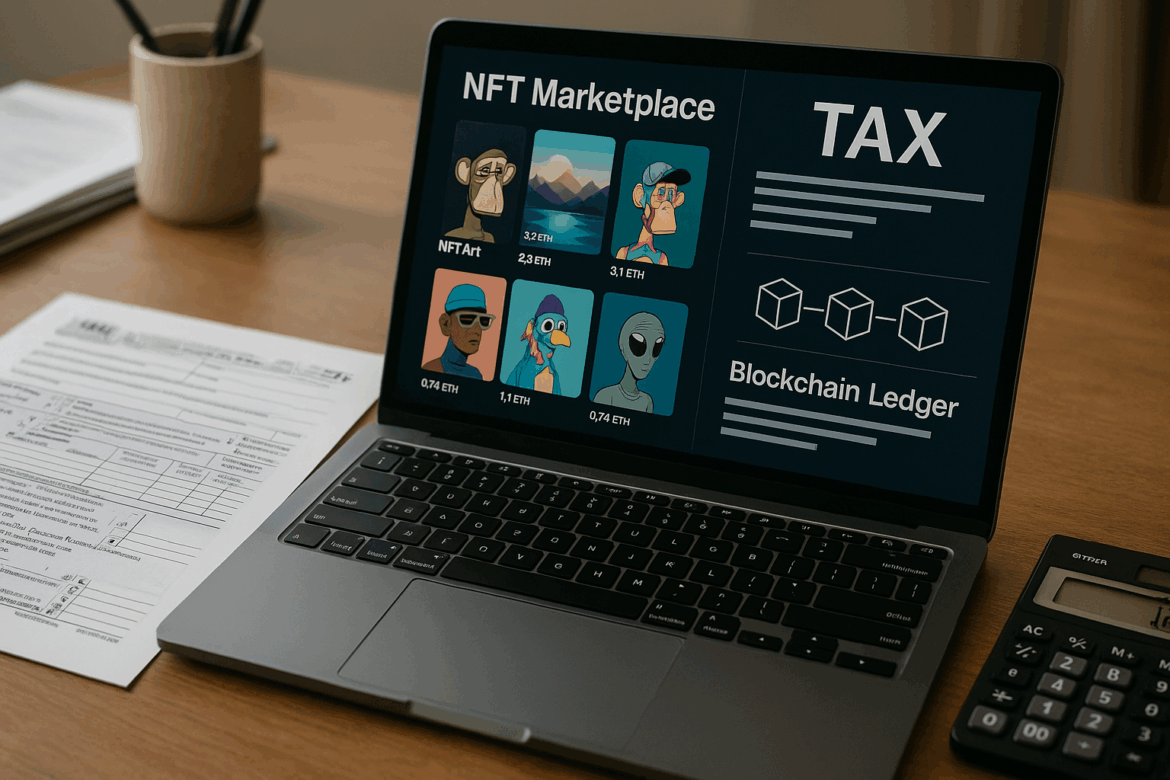Table of Contents
Introduction: From Wild West to Regulated Market
NFTs (non-fungible tokens) exploded in popularity between 2020 and 2022. From digital art and music to virtual real estate in the metaverse, billions of dollars flowed into the space. At first, tax authorities struggled to keep up.
Fast forward to 2025, and the landscape looks very different. Governments worldwide now have clear frameworks for how NFTs are taxed — treating them as assets, collectibles, or even income depending on the transaction type.
This guide explores how governments are taxing NFTs in 2025, focusing on the USA, UK, Canada, and Australia, while also providing global insights.
Chapter 1: The Basics of NFT Taxation
NFTs are unique blockchain-based tokens that represent ownership of digital or physical assets.
Taxation generally depends on:
- Buying & Selling – NFTs sold for profit are subject to capital gains tax.
- Creating & Selling (Minting) – Artists and creators often owe income tax.
- Trading NFTs for Other NFTs – Considered a taxable event in many countries.
- Royalties – Recurring royalties for NFT creators are taxed as income.
In short: If you make money from NFTs, expect taxes to apply.
Chapter 2: How the USA Taxes NFTs in 2025
- Capital Gains Tax: Selling NFTs for profit = taxable capital gain.
- Collectibles Rate: IRS classifies many NFTs (art, music, collectibles) as “collectibles,” taxed up to 28% — higher than standard capital gains.
- Income Tax: NFT creators (artists, musicians, developers) pay regular income tax on initial sales.
- Royalties: Ongoing royalties are ordinary income.
- NFT-to-NFT trades: Each trade is a taxable event based on fair market value.
Example:
- Buy NFT for $2,000, sell for $10,000 → $8,000 taxable capital gain.
- Mint and sell NFT for $500 → taxed as income, not capital gains.
Chapter 3: How the UK Taxes NFTs in 2025
- Capital Gains Tax (CGT): Applies to NFT sales, similar to crypto.
- Income Tax: NFT creators or frequent traders may be considered “trading” and taxed under income tax rules.
- VAT (Value Added Tax): Digital art NFTs may trigger VAT obligations if sold within the UK.
- Royalties: Ongoing NFT royalties taxed as income.
- HMRC Reporting: Full disclosure required, penalties for underreporting are strict.
UK investors must be cautious: HMRC treats frequent NFT activity like a business, which means higher tax rates.
Chapter 4: How Canada Taxes NFTs in 2025
- Capital Gains: 50% of NFT profit is taxable as capital gains.
- Business Income: If trading NFTs is frequent, Canada Revenue Agency (CRA) may classify it as business income, taxed at full rates.
- NFT Creators: Sales counted as income (self-employment/business).
- Royalties: Taxed as recurring income.
- GST/HST: Applies to digital goods (including NFTs) sold to Canadian customers.
Canada has one of the clearest frameworks, but also one of the strictest reporting systems.
Chapter 5: How Australia Taxes NFTs in 2025
- Capital Gains Tax (CGT): NFTs sold at a profit trigger CGT.
- Income Tax: If NFTs are part of a business or professional activity, profits taxed as income.
- GST (Goods and Services Tax): May apply to NFT sales in Australia.
- Royalties: Counted as assessable income.
- ATO Monitoring: The Australian Taxation Office tracks blockchain wallets actively.
Example:
- Buy NFT for AUD $1,000, sell for AUD $5,000 → $4,000 CGT.
- Mint NFT as an artist → income tax obligation.
Chapter 6: Global Overview (Other Regions)
- EU: NFTs fall under MiCA (Markets in Crypto-Assets Regulation). Taxation varies by country but generally treated as digital assets.
- Japan: NFTs taxed under “miscellaneous income.”
- India: NFTs taxed at 30% flat rate, similar to crypto.
- Singapore: No capital gains tax, but business income rules apply.
The trend: Most governments treat NFTs like assets or collectibles.
Chapter 7: Risks of Ignoring NFT Taxes
- Penalties – Non-compliance leads to fines or audits.
- Blockchain Transparency – Governments now track wallets through exchanges.
- Double Taxation Risks – In cross-border NFT sales.
- Complex Calculations – NFT-for-NFT swaps create complicated taxable events.
Chapter 8: How to Stay Compliant as an NFT Investor in 2025
- Track Every Transaction – Use NFT tax software like Koinly, TokenTax, or CoinTracker.
- Separate Business vs Hobby – Tax treatment depends on classification.
- Report Royalties – Don’t forget recurring income streams.
- Consider Holding Periods – Long-term capital gains often taxed at lower rates.
- Consult a Tax Professional – Especially if trading across borders.
Chapter 9: NFT Taxes vs Crypto Taxes
| Feature | NFTs | Cryptocurrencies |
|---|---|---|
| Classification | Collectibles / digital assets | Digital currency / assets |
| Capital Gains Rate | Higher (28% in USA for collectibles) | Lower standard CGT in many countries |
| Royalties | Yes (income tax) | No equivalent recurring royalties |
| VAT/GST | Often applies to NFT art | Less common for crypto trading |
Chapter 10: The Future of NFT Taxation
- Stricter Reporting – Automatic exchange of NFT tax data between governments.
- NFT-Specific Rules – Separate frameworks from crypto taxes.
- Cross-Border Tax Agreements – To prevent double taxation.
- Integration with CBDCs – Governments may track NFT payments through central bank digital currencies.
- More Professionalization – Investors will treat NFTs like traditional assets with tax planning.
FAQs
1. Do I owe taxes if I bought an NFT but didn’t sell it?
No, only realized gains are taxable.
2. Are NFT airdrops taxable?
Yes, most countries treat them as income.
3. Do creators pay more tax than investors?
Yes, because creators’ sales count as ordinary income.
4. Are NFT losses deductible?
Yes, but rules vary by country.
5. Can NFTs be part of retirement accounts?
In 2025, mainstream retirement vehicles don’t allow NFTs directly.
Outbound Links (Helpful Resources)
- IRS – NFTs and Collectible Taxes
- HMRC – Cryptoassets and Tax
- CRA – Taxation of Digital Assets
- ATO – NFTs and Taxation
Conclusion: NFTs Enter the Tax Net
By 2025, the days of NFTs being “tax-free” are long gone. Governments have caught up, and frameworks are in place worldwide.
- USA: NFTs often taxed as collectibles (up to 28%).
- UK: CGT, income tax, and VAT apply.
- Canada: 50% of gains taxable, GST/HST on sales.
- Australia: CGT, income tax, and GST obligations.
The key takeaway: NFT investors must track and report all transactions carefully. NFTs are here to stay, and so are NFT taxes.
Also, checkout more similar blogs here.

